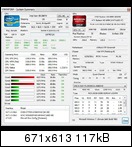sirmonkey1985
[H]ard|DCer of the Month - July 2010
- Joined
- Sep 13, 2008
- Messages
- 22,414
Yea but you know those 8-core 3.0GHz Xeons in the wild will probably run north of $1k so interesting proposition if you were so inclined.
maybe on fleabay but through retail your probably looking at north of 2k.
![[H]ard|Forum](/styles/hardforum/xenforo/logo_dark.png)
